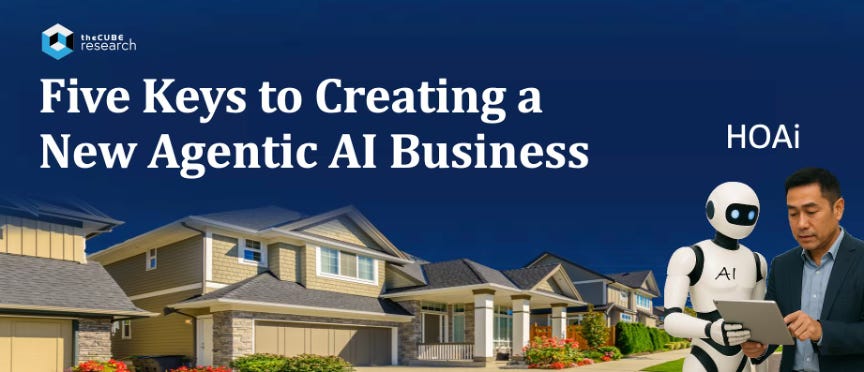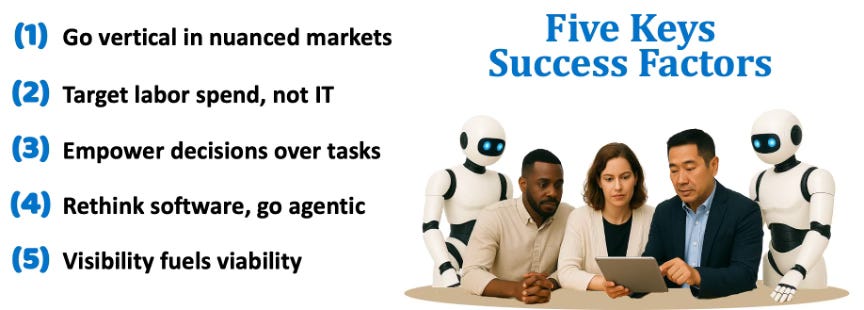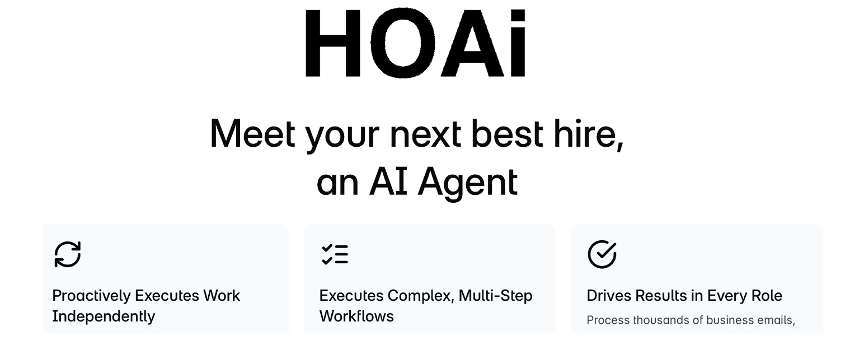Five Keys To Creating an Agentic AI Business
We’re entering what many call the “golden age of AI agents” — a pivotal moment in tech evolution where domain-specific digital coworkers reshape how businesses operate, create value, and engage the world. These AI agents don’t just automate tasks; they reason, act, and collaborate alongside humans to enhance decision-making and accelerate outcomes.
As a result, a massive new market category is forming — agentic AI businesses — projected to grow at a staggering 45% compound annual rate and reach $47 billion by 2030. This has also sparked the creation of tens of thousands of new startups looking to tap into the next transformative wave in AI for business.
In this article, we break down the blueprint for building and scaling a successful agentic AI business with the help of Haoyu Zha, a Y-Combinator alumnus and founder of HOAi, a fast-growing startup transforming how homeowner associations (HOAs) operate with the help of digital workers
We’ll also explore why now is a great time to launch a startup in this space. Unlike the SaaS era, startups can now go from idea to market leadership with fewer resources and greater speed than ever before, targeting the most significant portion of business spend — labor.
Whether you’re a founder, an investor, or a technologist, this article will outline the five foundational keys to thriving in the new area of agentic AI.
Watch the Podcast
What does it take to build — and rapidly scale — a successful company in the era of Agentic AI? Watch this podcast where we explore that question with Haoyu Zha, the Y-Combinator founder of HOAi, a fast-growing startup harnessing AI agents as digital workers to transform how homeowner associations (HOAs) operate. Founded just a few years ago, they have scaled to manage over 1 million homes. Learn the five keys to success!
The Startup Boom in the Age of AI
The rapid maturing of AI has sparked a surge of new startup ventures, but amid the hype, most will not survive. According to PitchBook, Startup Genome, and CB Insights, more than 17,000 AI startups have launched in the U.S. over the last decade. Globally, the number approaches 70,000. It is projected to accelerate from here as Agentic AI comes onto the scene.
· 58% of global VC investment in Q1 2025 was in AI startups
· 28% growth in new startups in Q1 2025 compared to the previous year
· 80% increase in AI startup venture capital funding in 2024
These numbers reflect a changing tide in innovation priorities. Investors are doubling down. Enterprises are no longer just experimenting — they’re deploying real AI into their operations and planning to evolve to agentic AI rapidly. The movement isn’t just about chasing hype; it’s about strategic opportunity. Investors view AI not as a niche but as the next foundational platform — and even more significant than the cloud and mobile revolutions of the last decade — capable of fundamentally reshaping every industry. With AI-native infrastructure maturing and time-to-deployment shrinking, the path to revenue and scale has become faster and more capital-friendly.
The allure is equally compelling for top talent. They are departing from large incumbents in search of greater autonomy, enhanced creative control, and the opportunity to influence products from the ground up. AI startups present qualities that appeal to mission-driven builders eager to move quickly and address real-world challenges, with enormous rewards potential on the horizon.
Yet, despite the explosive growth and investor enthusiasm surrounding artificial intelligence, the stark reality is that up to 90% of AI startups are projected to fail. While AI holds immense transformative promise, the journey from prototype to profitable product remains steep and unforgiving. Many startups will launch with excitement and initial funding, only to plateau when their technology fails to deliver meaningful business value or differentiate itself in an increasingly saturated market. Most startups will struggle to move beyond hype, provide sustainable value, and emerge from a crowded marketplace by not recognizing that the game has changed from the previous era of SaaS businesses.
In the coming months and years, we’ll likely see a surge in early-stage experimentation followed by a wave of quiet shutdowns or strategic pivots. Some will be absorbed by more prominent players seeking talent or intellectual property, while others will run out of capital before reaching product-market fit. As generative AI becomes commoditized, startups that merely wrap existing foundation models in AI agents will find it difficult to survive. The winners will be those who combine speed with substance, building real solutions to real problems in highly domain-specific sectors where digital labor can deliver new, measurable impact.
The Blueprint for Success
A new class of AI-native startups is emerging that takes a fundamentally different approach: they are building agentic AI systems that do real work, augment human decision-making, and tackle function-level processes with domain-specific intelligence. They are moving beyond novelty — chasing headlines with flashy generative AI demos — and are now focusing on solving significant, enduring business problems that generative AI and LLMs alone cannot address.
One standout in this new wave is HOAi, which has scaled from zero to over 1 million homes under digital management in just two years. This brief explores how HOAi achieved hypergrowth, what its customer success reveals about agentic AI’s potential, and what the blueprint for startup success looks like in this new era.
We’ll explore the five keys to success, as brought to life by HOAi:
Go vertical in nuanced markets: The opportunity is domain-specific AI agents that big LLM providers can’t or won’t reach.
Follow the labor spend, not the IT: Traditional software tapped into IT budgets; target labor spend, which is a 10–20x bigger opportunity.
Empower decisions over tasks: Enhancing human judgment, not merely automating tasks, creates strategic impact
Rethink software, go agentic: Don’t retrofit yesterday’s blueprint. Build value that SaaS never addressed. Agent productivity is your savior.
Visibility fuels viability: Even the most innovative AI agents risk being overlooked in a crowded market. Credibility starts with visibility.
HOAi - A Real-world Success Story
HOAi represents a powerful success story in the emerging era of agentic AI, and its journey holds essential lessons for conceiving, building, and scaling an AI business. When launched in late 2022, it entered a market with 457 active software competitors.
Born out of firsthand frustration with the inefficiencies of managing a homeowner association (HOA), founder Haoyu Zha transformed a personal pain point into a groundbreaking business opportunity. After serving on his own HOA board and recognizing the operational burdens faced by both board members and property managers, Haoyu started developing an agentic AI solution tailored to the needs of this vastly underserved market. His experience on the HOA board revealed a system riddled with inefficiency, paperwork, and friction. Despite the market encompassing 40 million homes and more than 400,000 HOAs in the U.S., software adoption in the space was minimal, and experiences were poor across the board.
Accepted into Y Combinator and supported by seed-stage investment, HOAiquickly tapped into the HOA property management industry’s labor-intensive, judgment-based back-office workflows. The company achieved product-market fit in 2024 by focusing on building AI agents — digital coworkers — that go beyond answering questions to actually getting work done. As Haoyu explained,
“Agentic AI is meant to get the work done end-to-end, not just simply automating repetitive tasks. We didn’t just build tools. We built digital coworkers that bring superpowers to teams managing HOAs. The opportunity was not in replacing existing software but in creating new value that traditional systems couldn’t deliver.”
Most of the work in HOA management — like accounts payable, budgeting, and homeowner requests — is performed in the back office by humans staring at screens, interpreting unstructured data, and making small but frequent judgment calls. This creates a perfect use case for agentic AI: digital work, but too nuanced for deterministic software. Zha’s insight suggested that AI, combined with tools, decision-intelligence, context, and workflow systems, could emulate the judgment of a human clerk.
HOAi’s success is grounded in its approach of rethinking what software needs to become, not what it has traditionally been. They built an agentic architecture, from the bottom up, that included three key components that work together to enable HOA digital coworkers:
A Cognitive Core: At its foundation, HOAi augmented GenAI and LLMs to better reason across unstructured communication, documents, and internal policies.
Dynamic application Integration: Agents seamlessly interact with payment systems, ledgers, invoice platforms, and customer service workflows.
Agentic Workflow Framework: Going beyond AI chats, it builds complete workflows with autonomous agents that perform tasks end-to-end — from processing invoices to managing budget drafts.
By embedding predictive and generative AI into domain-specific workflows, HOAi exemplifies how startups can rapidly grow by leveraging SaaS infrastructure and focusing on judgment-heavy industries ripe for transformation.
With this approach, HOAi was able to help property managers “employ” digital coworkers to scale and enhance back-office operations and homeowner services, while augmenting rather than replacing existing SaaS tools.
The Impact of Digital Labor
HOAi’s digital coworkers can now efficiently handle everything from accounts payable processing to budget generation, vendor coordination, and self-serve homeowner inquiries. By augmenting HOA workforces, they’ve created a tangible impact on HOAs by freeing up human labor for higher-value roles, accelerating homeowner services, enabling preventive maintenance, and reducing costs.
Beyond efficiency, the customer experience has improved. Homeowners receive faster, clearer responses. Support requests are routed more accurately. Property managers are now better equipped to serve their communities and build relationships rather than chase paperwork. The impact can be summarized in four dimensions:
Efficiency: Automating routine tasks allows HOA boards to focus on strategic decision-making.
Cost Savings: Predictive maintenance and streamlined operations can lead to significant cost reductions.
Enhanced Communication: Transparent and timely communication fosters trust between residents and HOA boards.
Data-Driven Decisions: Access to analytics enables informed decision-making, improving community management.
As Peter Grimes, CEO and founder of EJF Real Estate Services, Inc., stated, the impact of the HOAi agents on their business were significant:
A/P reduced from 750 hours a month to 3 minutes
2,000 hours of budgeting time were eliminated
$10,000 per month in labor savings
5-star homeowner rating soared
These outcomes were all accomplished by AI agents with human supervision. The human supervisors simply needed to approve the work the AI would do after evaluating and optionally tweaking the AI agent’s proposed plan of action. After hitting “OK,” the agent autonomously completes the work, providing status updates as appropriate. This is very different from what traditional software packages could do.
Building on this momentum, in just the first four months of 2025, HOAi has scaled its customer base 6x and now supports more than 1 million homeowners, just a fraction of the total market of some 40 million households.
Watch the EJF Real Estate Services explain the value of AI Agents.
What to Do and When
The agentic AI era is not just a wave — it’s a “Supercycle” that will rewire how software is built, bought, and valued. The timing is rare. The infrastructure is ready. The barriers are down. The playbook is evolving. We are witnessing the formation of an entirely new middleware layer that connects data with intelligent actions.
To learn more about building an Agentic AI business, we’d recommend you read the entire research report with further details the five keys to success and check out the following podcasts.
Most importantly, tune into the AI Agent Builder Summit to hear from industry pioneers from the companies listed below.
Finally, as always, contact me if i can help you on this journey by booking a briefing here or messaging me on LinkedIn.
Thanks for reading. Feedback is always appreciated.









